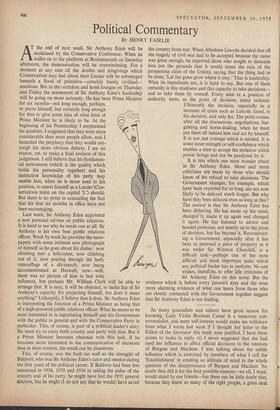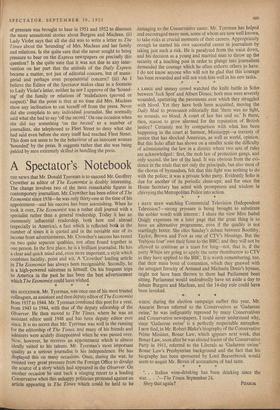Political Commentary
BY HENRY FAIRLIE Last week, Sir Anthony Eden appointed a new personal adviser on public relations. It is hard to see why he needs one at all. Sir Anthony is his own best public relations officer. Week by week he provides the news- papers with some intimate new photograph • of himself as he goes about his duties : now climbing into a helicopter, now climbing out of it; now peering through the leafy camouflage of a slit-trench; now being decontaminated at Harwell; now—well, there was no picture of him in bed with influenza, but perhaps Mr. William Clark will be able to arrange that. It is easy, it will be objected, to make fun of Sir Anthony's capacity for projecting himself, but does it mean anything? Unhappily, I believe that it does. Sir Anthony Eden is interpreting the function of a Prime Minister as being that of a high-powered public relations officer. What he seems to be most interested in is ingratiating himself and his Government with the public in general and with the Conservative Party in particular. This, of course, is part of a political leader's- duty. He must try to carry both country and party with him. But if a Prime Minister becomes obsessed with this task, if he becomes more interested in the communication of decisions than in their content, the result can be disastrous.
This, of course, was the fault (as well as the strength) of Baldwin, who was Sir Anthony Eden's tutor and mentor during the first years of his political career. If Baldwin had been less interested in 1934, 1935 and 1936 in taking the pulse of the country and of his party, he might have lost the 1935 general election, but he might (I do not say that he would) have saved the country from war. When Abraham Lincoln decided that all the tragedy of civil war had to be accepted because the cause was great enough, he reproved those who sought to dissuade him (on the grounds that it would mean the ruin of the prosperous cities of the Union), saying that the thing had to be done. 'Let the grass grow where it may.' That is leadership. What its ingredients are, it is hard to say. But one of them certainly is this readiness and this capacity to take decisions— and to take them by oneself. Every man in a position of authority must, at the point of decision, stand isolated. Ultimately the decision, especially in a moment of crisis such as Lincoln faced, is his decision, and only his. The point comes, after all the discussions, negotiations, bar- gaining and horse-dealing, when he must put them all behind him and act by himself. It is not just courage which is needed. It is some inner strength or self-confidence which enables a man to accept the isolation which power brings and not be paralysed by it.
It is this which one must wonder about in Sir Anthony Eden. More and more criticisms are made by those who should know of his refusal to take decisions. The Government changes, for example, which have been expected for so long, are not now likely to be delayed much longer. But why have they been delayed even as long as this? 'the answer is that Sir Anthony Eden has been dithering. He has made up his mind, changed it, made it up again and changed it again. He has listened to advice and heeded pressures, not merely up to the point of decision, but far beyond it. Reconstruct- ing a Government, especially after it has been as personal a piece of property as it was under Sir Winston Churchill, is a difficult task—perhaps one of the most difficult and most important tasks which any political leader has to perform. No one wishes, therefore, to offer idle criticisms of Sir Anthony Eden on this score. But the evidence which is before every person's eyes and the even more alarming evidence of what one hears from those who are closely connected with the Government together suggest that Sir Anthony Eden is not leading.
As many journalists and editors have good reason for knowing, Lady Violet Bonham Carter is a tenacious con- troversialist, and mere self-interest would make me withdraw from what I wrote last week if I thought her letter to the Editor of the Spectator this week were justified. I have three points to make in reply. (i) I never suggested that she had used her influence to affect official decisions in the interests of Burgess and Maclean. I was talking about the subtle influence which is exercised by members of what I call the 'Establishment' in creating an attitude of mind to the whole question of the disappearance of Burgess and Maclean. No doubt they did it for the best possible reasons—we all, I hope, would stand by our friends—but there can be little doubt that, because they knew so many of the right people, a great deal of pressure was brought to bear in 1951 and 1952 to discount the more sensational stories about Burgess and Maclean. (ii) Lady Violet says that all she did was to write a letter to The 'Times about the 'hounding' of Mrs. Maclean and her family and relations. Is she quite sure that she never sought to bring pressure to bear on the Express newspapers on precisely this question? Is she quite sure that it was not due to any inter- vention on her part that the attitude of the Daily Express became a matter, not just of editorial concern, but of mana- gerial and perhaps even proprietorial concern? (iii) As I believe the Editor of the Spectator makes clear in a footnote to Lady Violet's letter, neither he nor I approve of the 'hound- ing' of the family or relations of 'malefactors (proved or suspect).' But the point is that at no time did Mrs. Maclean show any inclination to cut herself off from the press. Never did she complain to any individual journalist. She normally said what she had to say 'off the record.' On one occasion when she did say something 'on the record' to a number of journalists, she telephoned to Fleet Street to deny what she had said even before the story itself had reached Fleet Street. This does not seem to be the behaviour of an innocent woman 'hounded,' by the press. It suggests rather that she was being guided by men extremely skilled in handling the press.



































 Previous page
Previous page